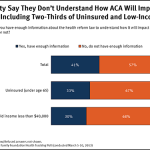Two-thirds of uninsured adults—the very people the law sets out to help—are also in the dark
It’s been three years since President Barack Obama signed the Affordable Care Act into law, yet two-thirds of uninsured adults—the very people the law sets out to help—say they still don’t know what it means for them.
Sixty-seven percent of the uninsured younger than age 65—and 57 percent of the overall population—say they do not understand how the ACA will impact them, according to a poll released Wednesday by the Kaiser Family Foundation (KHN is an editorially independent program of the foundation). The poll also found that Americans’ expectations of how the law will affect health-care costs, quality and consumer protections are more negative than positive.
Enrollment for new coverage in the exchanges and Medicaid expansion is set to begin on October 1. That gives states and the federal government less than a year to educate consumers about signing up for coverage through online portals, by phone or with the help of in-person assistance.
But the public does not seem to be focusing on state implementation efforts.
Specifically, 48 percent say they have heard nothing at all about whether their state will run its own exchange. Seventy-eight percent say they haven’t heard enough to say whether their state plans to expand Medicaid, a decision the Supreme Court made optional in its landmark ACA decision last year. “This is equally true in states where the governor has states they will expand Medicaid and in those whose governor has said they will not move forward with the expansion,” the pollsters note.
In fact, the public seems actually to be even less knowledgeable about the health law’s more popular provisions than they were three years ago, including tax credits to small business to buy insurance, subsidy assistance for individuals and guaranteed issue of health insurance.
Many also continue to hold false impressions of the law: 57 percent incorrectly believe that the ACA includes a public option. Nearly half believe the law provides financial assistance for illegal immigrants to buy insurance. And 40 percent—including 35 percent of seniors—still believe that the government will have “death panels” make decisions about end-of-life care for Medicare beneficiaries.
Overall, the evidence suggests that the Obama administration, state governments, advocates and the health-care industry have a big job ahead of them to educate the public by 2014. The stakes are high: In order for the financial structure of the ACA to hold up, a healthy cross-section of Americans must sign up for both Medicaid and the new exchanges. If they don’t, the pool will likely be filled with sicker individuals, and premium rates could skyrocket.
The poll was conducted March 5 through March 10 and surveyed 1,204 adults. The poll has a margin of error of +/- 3 percentage points.
This story originally appeared on Kaiser Health News. Kaiser Health News is an editorially independent program of the Henry J. Kaiser Family Foundation, a nonprofit, nonpartisan health policy research and communication organization not affiliated with Kaiser Permanente.






